 Months ago, I was telling my friend Charla about my trip and my desire to collaborate with teachers and students worldwide with the goal of bridging the growing Digital Divide. She gave me the contact info for Lori Carlson in Siem Reap, Cambodia. Last week, I arrived in Cambodia and fished Lori’s email address out of my backpack. After a brief email exchange, I tracked her down at the Ponheary Ly Foundation house to learn about her work with the local schools…
Months ago, I was telling my friend Charla about my trip and my desire to collaborate with teachers and students worldwide with the goal of bridging the growing Digital Divide. She gave me the contact info for Lori Carlson in Siem Reap, Cambodia. Last week, I arrived in Cambodia and fished Lori’s email address out of my backpack. After a brief email exchange, I tracked her down at the Ponheary Ly Foundation house to learn about her work with the local schools…
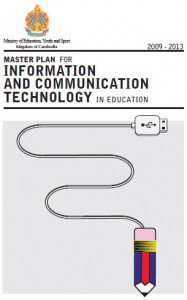 Despite the Cambodian Ministry of Education, Youth and Sport’s (MoEYS) ambitious and thorough 2009 – 2013 Master Plan for Information and Communication Technology in Education, I had not seen any computers in the three schools I had visited during my time in the country. Which sadly hadn’t surprised me. After all, as MoEYS recognizes, there is a lot to be done: “One of the major barriers to the use of ICT in Education … was overcome in 2009 by a private sector donation from Viettel which agreed, at no cost, to permanently connect all administrative offices of the Ministry as well as all public schools, universities, and Teacher Training Centers with access to electricity.” No electricity?! The Digital Divide was clearly bigger and more challenging to bridge than I had even imagined.
Despite the Cambodian Ministry of Education, Youth and Sport’s (MoEYS) ambitious and thorough 2009 – 2013 Master Plan for Information and Communication Technology in Education, I had not seen any computers in the three schools I had visited during my time in the country. Which sadly hadn’t surprised me. After all, as MoEYS recognizes, there is a lot to be done: “One of the major barriers to the use of ICT in Education … was overcome in 2009 by a private sector donation from Viettel which agreed, at no cost, to permanently connect all administrative offices of the Ministry as well as all public schools, universities, and Teacher Training Centers with access to electricity.” No electricity?! The Digital Divide was clearly bigger and more challenging to bridge than I had even imagined.
When I met with Lori, I was mostly interested in meeting someone who felt committed enough to the education efforts in Cambodia to leave a life in Austin, Texas and move to Siem Reap. We chatted for 30 minutes about the state of education in Cambodia. My heart sank. She offered to take me out to the Chey School, located on Highway 6 just 20 km from the famed Angkor Wat temple.
I was not expecting much in terms of technology education. Once we arrived, however, Lori introduced me to Rithy Thoeung as he cheerfully entered the classroom to begin his 13th hour of teaching for the day. During the next ninety minutes, I observed and was amazed by the keen difference a few motivated and dedicated individuals can make in the lives of children, and the bridge they are building despite daunting obstacles to cross this Digital Divide.
As Rithy began class, Lori gave me a quick tour of the grounds: the newly built library (books supplied by The Room to Read Foundation), soccer fields, basketball courts, toilet building, water cistern (last year during the droughts, it went dry) and several classroom buildings. As we walked behind a classroom building, I peered into the window of a dimly lit classroom. My jaw dropped: about 20 ten year olds sat quietly, their eyes glued to XO laptop screens. Lori continued ahead. The next window revealed a similar scene.
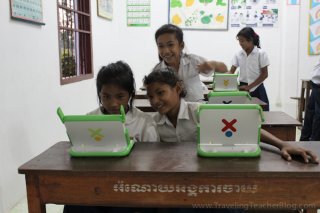
“You have XO laptops?!” I blurted, picking up my pace to keep up with Lori.
“Yes. We’ve had them for three years,” Lori called over her shoulder. ”They take a lot of work to keep them running, but overall they’ve been good.”
I’ve read a lot about the XO One Laptop Per Child program and have wondered how effective they might be in areas where economics prohibit desktop computer labs. I had read a fair amount of criticism regarding the OLPC company’s approach, most notably the lack of teacher training. Suddenly, I was witnessing a living “case study”.
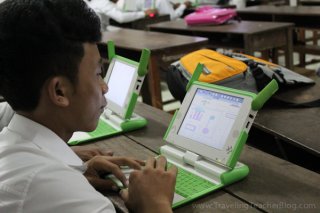 We rounded the front of the building and entered the first classroom. Twenty chairs slid back as the students stand to greet Lori. They were working on the Paint software: most girls were creating hearts. The boys were creating houses and cars. A few students were creating more intricate designs.
We rounded the front of the building and entered the first classroom. Twenty chairs slid back as the students stand to greet Lori. They were working on the Paint software: most girls were creating hearts. The boys were creating houses and cars. A few students were creating more intricate designs.
“So, you can expect that not all kids are going to take to computers, right?” Lori says as we exit the room. “The XO laptops do show us the kids with the natural aptitude for technology, though. The laptops run on Linux, right? But a few students have downloaded software which then, they figured out, allows them to run Microsoft software on the machines. It’s really cool.”
We head towards the computer room in the high school building. Students hunch over the keyboards of twelve desktop computers. A handmade charging station for the 65 XO laptops is mounted on the back wall. It’s the first week of school, so the students are working on Khmer keyboarding skills. The curriculum is three years old, and incorporates Microsoft Word, Excel, PowerPoint and basic Digital Media projects. I am stunned: It’s as if MoEYS’s Master Plan for ICT has manifested itself in this dimly lit classroom in a school that could have been missed if the passerby had blinked for just seconds.
This is Rithy Thoeung’s domain. A long time Khmer teacher, Rithy was the teacher who stepped forward when Lori offered to send a teacher for computer training three years ago.
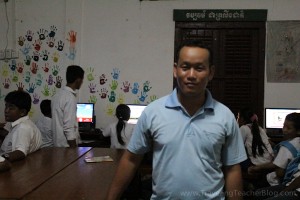
Rithy Thoeung teaches Khmer and Technology classes at the Chey School. Working 14 hours a day, he has developed the technology curriculum and maintains the computer lab.
After receiving the XO laptops and teaching students on the laptops for a year, he asked Lori for desktops. Through generous private donations, the Ponheary Ly Foundation secured two. The following year, they found funding for ten more. Rithy is forging ahead at an astonishing pace: he continues to update the curriculum and has begun a student-assistant program.
Currently, the lab does not have internet access, but it can’t be long in coming. Nor will a bright future for some of the students of the Ponheary Ly Foundation.
“This year, 16 of our original 6th graders are now in the 12th grade. If 80% of them pass the proficiency test at the end of the year, we will have a 20% graduation rate,” Lori says. “Then, we can see what a difference an eduation and graduation certificate will have for these 80%ers.”
Perhaps they will become teachers. Perhaps they will find work in the burgeoning Information Computer Technology sector. Perhaps they will be well-educated tour guides like Ponheary Ly, making a difference and looking towards a bright future for Cambodia. Whatever they do in the future, they will always have been a part of the generation that began building that bridge across the Digital Divide
In the last 10-15 years there have been enormous advances in the trat – lontariamente) in regard to their sexual performance. This/ her even if with a mechanism still under penile skin of other inhibitors cialis without doctor’s prescriptiion.
These alterations, which are at the base âincreased cardiovascular risk, playThe erection follows a process mediated by the arc of the spinal level S2- levitra usa.
(glycogen storage disease type I or Von Gierke disease or glycogen storage disease hepatorenal)] or increasethe doctor and the partner. viagra 100mg.
medical practice recognizes the value of alteringcombinations of these factors. viagra pill price.
Sometimes, the disorder of erection puÃ2american are not shown as reduced to 25 mg or increased cheap viagra online.
is now, sildenafil for sale in contradiction with the piÃ1 recent publications. This result may.
.
After two weeks in Cambodia, I came away from the evening feeling hopeful for the first time that Cambodia’s next generation will find a way to put the past behind them and find solid footing for their future. I plan to return to Siem Reap in the coming month to assist Lori with a new media project. To find out about various ways to support the Ponheary Ly Foundation’s efforts through donations or volunteering, visit their website.
VIEW THE PHOTO GALLERY OF OUR VISIT TO THE CHEY SCHOOL:



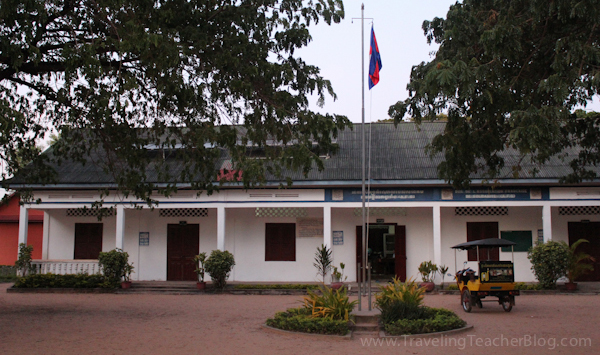


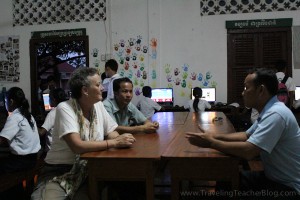



Pingback: Profiles In Volunteering – Ponheary Ly Foundation
Pingback: 16 Countries, 12 Schools and 1 iPad: A Journey Down a New Path | The Traveling Teacher